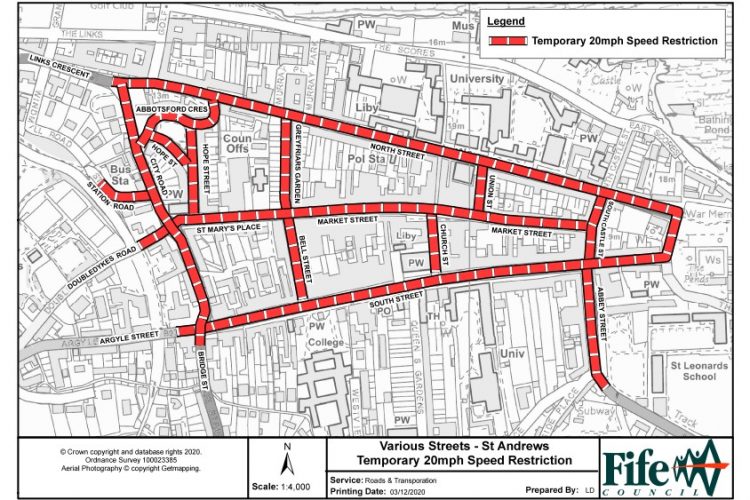With a temporary 20mph speed limit being introduced in the centre of St Andrews (see map) under the Scottish Government’s Spaces for People initiative, new research led by the University of St Andrews has demonstrated that such a measure can significantly impact on the rate of road traffic collisions (RTCs).
Dr Valentin Popov of the School of Mathematics and Statistics at the University of St Andrews with collaborators from the universities of Edinburgh, East Anglia and Cambridge introduced a cutting-edge methodology to identify shifts in the trend of RTCs and associate them with possible causes.
The research team investigated the effect of the policy on a city-wide scale in Edinburgh, introduced in 2016.
Published in Environment and Planning B, the research found that around the time of the introduction of the 20mph policy in Edinburgh, the trend transitioned from a “slow-decreasing” state to a “fast- decreasing” state.
The research provided strong evidence that although a decline in RTCs was already underway when the 20mph limit was introduced, the introduction of the new limit led to a further decline in the rates of RTCs. Dr Popov and collaborators are careful to note that they are not arguing for direct cause and effect and that the decline may be due to a cultural shift rather than directly attributable only to the introduction of the new lower limit.
The research found that the average number of RTCs per month in Edinburgh in 1997 was 165, while in 2016, the year of the intervention (introduction of 20mph limit), the average RTCs per month was just above 95. By 2018 this number had fallen to 64.
Dr Popov said: “We have reasons to believe that the 20mph policy was effective, at least in the short-term. This shows that 20mph limits are worth considering in cities where there is a concerted will to reduce RTCs and make roads safer for users.”
As part of the research, the team also noted a seasonal pattern, which indicated an RTC peak in the autumn and a trough at the start of the year. There is an isolated peak in August which can be attributed to the major arts festival occurring, prior to the pandemic, at that time of the year in Edinburgh.
The United Kingdom’s Department for Transport (DfT) reported that in the 12 months up to September 2018, there were 27,295 people killed or seriously injured on British roads.
Although deaths and injuries on the road have been declining locally and nationally (170,993 casualties in 2017 compared to 160,597 in 2018), as a preventable cause of death and disability, (RTCs) remain an important policy priority.
The paper, ‘Trend shifts in road traffic collisions: An application of Hidden Markov Models and Generalised Additive Models to assess the impact of the 20mph speed limit policy in Edinburgh’ by Valentin Popov, Glenna Nightingale, Andrew James Williams, Paul Kelly, Ruth Jepson, Karen Milton and Michael Kelly is published in Environment and Planning B and available online.
